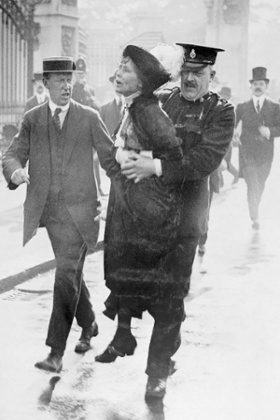
Patsy Kensit has this month made feminists engage in a communal eye-roll by suggesting in an interview with Stylist magazine that Kate Middleton is “the suffragette of our generation”; not for any political reason but because, by wearing the same outfit in public more than once, Kate has liberated the sisterhood from the hideous pressures of feeling they can’t wear the same dress twice.
It’s very easy to point out why this is a ridiculous comparison. For the sake of pedantry, let’s note that it’s physically impossible for Middleton to be a suffragette; she’s engaging in neither an active nor militant campaign to acquire women the vote and she hasn’t won one either. It is ludicrous to suggest that the ongoing fight for women’s equality and the oppression that women still face, all over the world to varying degrees, has been solved by a white upper-class woman.
A white upper-class woman furthermore, who by virtue of being married to the second in line to the throne, is the poster girl for one of the prime examples of unelected power in the UK. Bluntly, Kate’s function in public life, whether she wants it or not, is to look attractive for the fashion magazines and gawking paparazzi and to birth children for the same sycophants to fawn over. She cannot be compared to the women who fought and were tortured and mocked for their right to vote.

There was another reason that this comparison really irritated me personally; I am the great-great-great niece of one of those suffragettes to whom Kensit referred. Hilda Burkitt, my distant aunt, was an important figure in the Women’s Social and Political Union and left her job to become the Birmingham branch’s paid secretary, but her voice has been largely silenced by history.
In 1909, she was jailed with several others for throwing stones at the train of the prime minister, Herbert Asquith, and three days later became the first suffragette to be (illegally) force fed with a nasal tube. The Home Office was petitioned, but refused to interfere with the prison’s authority. In 1913, she was put under surveillance for trying to set fire to a grandstand in Leeds. In 1914, she and her companion Florence Tunks burned down the Bath Hotel in Felixstowe, which was empty for refurbishment. The press was horrified by the two suffragettes, who threw their shoes at one of the witnesses in the courtroom (he claimed to have seen them, they claimed that he only talked to them to try to “molest” them), then refused to sit still and had to be restrained by two policemen.
You’d think that I’d have grown up in the shadow of such an influential foremother, but I didn’t know about her activities. Neither did my grandfather, her great-nephew, who would have met her. A month into her two-year sentence, in 1914, she was released as part of the suffragette amnesty. Then in her late 30s, she married, then divorced, settled in Lancashire and never spoke of her suffragette past to her family again.
Before I began to research her, I couldn’t help but see Hilda as a vague copy of one of the few cultural depictions of a suffragette; the garrulous Mrs Banks in Mary Poppins, bedecked in her giant sash and annoying everybody with her raucous songs. The film presents Mrs Banks as an antagonist; her political pursuit of democratic equality means she doesn’t fit into her female role and her children are thus neglected and miserable. We are made to feel sorry for her equally distant and chauvinistic husband in his high-tier bank job, while we laugh at her trying to prove she’s not a second-class citizen.
However much of a caricature Mrs Banks is, there is one repeated line in her first song that is particularly poignant: “Our daughters’ daughters will adore us /as they sing in grateful chorus / well done sister suffragettes!” How sad then, that suffragettes are falling through the cracks of our still-patriarchal history, and that this recent reference to them was made when talking about one of the most privileged women in the UK.
It’s even sadder that nine million women didn’t use their votes in the last general election; one million more than the number of women who qualified to vote under the Representation of the People Act in 1918. Less than a century ago, working-class, single women such as Hilda sacrificed their independence, bodily autonomy and their reputations so that they and those after them could exercise that basic democratic right.
There are a lot of comparisons we cannot draw between ourselves as feminists and our first-wave ancestors because women now have many more rights than they did, but all over the world women are still being oppressed by their male counterparts. We cannot emulate our forebears’ struggle, but we can still remember and commemorate what they did, and make use of the right they worked so very hard for us to have. So it is with adoration and admiration that I shall say to myself when I drop my ballot paper into the box on 7 May: “Well done, great-great-great aunt suffragette!”







